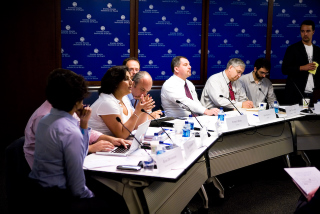Can You Help Me Now? Mobile Phones and Peacebuilding in Afghanistan
Mobile phone technologies are the subject of considerable enthusiasm in the peacebuilding sector. Yet little has been done to evaluate systematically the factors of success or failure in the use of mobile phones for peacebuilding. This event focused on the use of mobile phones in one of the most difficult conflict environments today: Afghanistan.
Mobile phone technologies are the subject of considerable enthusiasm in the peacebuilding sector. In the past few years, they have been used in connection with campaigns to restrain election violence, reduce corruption, develop the news media, and support counter-insurgency to name just a few. Success has been significant, but mixed. Yet little has been done to evaluate systematically the factors of success or failure in the use of mobile phones for peacebuilding. 
So to best understand the true potential of these increasingly powerful tools, USIP -- in partnership with cell phone pioneer Mobile Accord (who raised a record sum of over $37 million within three weeks of Haiti’s earthquake crisis with their “Text HAITI to 90999” campaign), the National Defense University, the United Nation’s-mandated UPeace, and TechChange -- brought together experts on international peacebuilding and mobile phone technology to focus on the use of mobile phones in one of the most difficult conflict environments today: Afghanistan.
- Improving governance - rule of law and anti-corruption
- Countering extremism - media development and counter-insurgency
- Delivery of essential services - education, health, agricultural development, commerce
Read a USIP Special Report Can You Help Me Now:? Mobile Phones and Peacebuilding in Afghanistan
Multimedia
Watch videos from this event:
- Introduction and Panel I: Tackling Corruption and Improving Governance
- Panel II: Countering Extremism and Counter-insurgency
- Panel III: Delivering Essential Services
Sheldon Himelfarb, Moderator
Executive Director, Center of Innovation for Science, Technology, and Peacebuilding
United States Institute of Peace
Panel 1: Tackling Corruption and Improving Governance
Panel 2: Countering Extremism and Counter-insurgency
Panel 3: Delivering Essential Services
Panelists included innovators from the DoD, Department of State, UN personnel, World Bank, Internews, Roshan, and NGOs (US and European) like Development Seed, Ushahidi, FrontlineSMS, and MobileActive.org.



